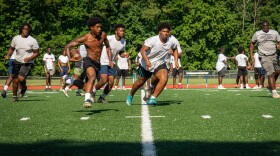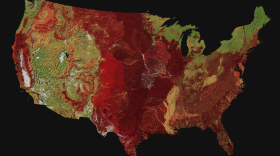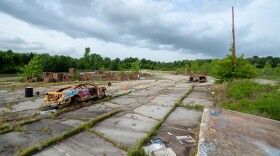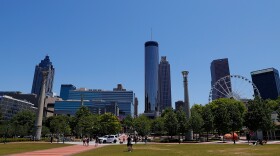
Molly Samuel
Molly Samuel joined WABE as a reporter in November 2014. Before coming on board, she was a science producer and reporter at KQED in San Francisco, where she won awards for her reporting on hydropower and on crude oil.
Molly was a fellow with the Middlebury Fellowships in Environmental Journalism and a journalist-in-residence at the National Evolutionary Synthesis Center.
She's from Atlanta, has a degree in Ancient Greek from Oberlin College and is a co-founder of the record label True Panther Sounds.
-
Starting practice at the hottest time of year, football players face dangers from the heat. Georgia high school heat rules have turned the state into a national model.
-
In Atlanta, leaders are working to build a memorial at an old brick factory site to honor victims of convict leasing. After the Civil War, thousands of Black men were forced to work at the factory.
-
Former Sen. Max Cleland of Georgia has died. He was 79 years old. He lost three limbs in Vietnam, but that didn't stop him from seeking higher office, where he advocated for veterans and the disabled.
-
There's a history of wildfire across America, a threat made worse by the warming climate. And more people are moving to fire-prone areas without realizing the danger.
-
The Southeast U.S. is one of the only places in the world where loggerhead sea turtles nest. But the state of Georgia is concerned they now face a threat from a federal change in ship canal dredging.
-
A brick factory that was key to building post-Civil War Atlanta used unpaid convict laborers. Now, some hope to block industrial development at the site and instead memorialize those mistreated there.
-
Power shut-off moratoriums imposed at the start of the pandemic are beginning to expire. Customers and utilities face a backlog of missed bills that may eventually be passed on to ratepayers.
-
A massive 656-ft. cargo ship filled with thousands of new cars has been stuck, capsized off the Georgia coast for months. Now, crews are getting ready to dismantle the ship and remove it piecemeal.
-
Winters are warming faster than summers in many places, and colder parts of the U.S. are warming faster than hotter ones. The warming winter climate has year-round consequences across the country.
-
Dozens of cities have ambitious plans to get their electricity from clean or renewable sources. But those goals can clash with power providers, whose priority remains economics, not climate change.








